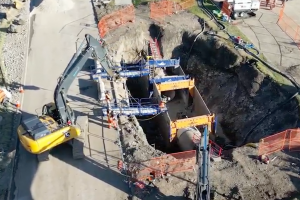It’s been hard to avoid news about the data-harvesting scandal involving Facebook and Cambridge Analytica since the Guardian newspaper broke the story in March.
The data analytics firm harvested millions of Facebook profiles of American voters taken without authorization in early 2014. Then it built a system that could create profiles of individual American voters so they could be targeted with personalized political ads.
There is nothing new about data breaches but this could be among the worst ever.
Not only was this one huge, but it seems to have been used to tamper with the outcome of the most recent American presidential election.
Cambridge Analytica is owned by hedge-fund billionaire Robert Mercer and at the time the data breach occurred was headed by Stephen Bannon, then a key adviser to Donald Trump’s presidential campaign.
All of this makes the data breach an important news story, but what significance does it have for the construction industry?
Many firms have Facebook pages, as do many of their employees, so depending on the privacy settings you used, information about you or your company could conceivably be compromised.
It’s not just Facebook. How many other sites are harvesting data without your knowledge? I was wondering about that one day recently when a single email showed up in my inbox yielding three examples of reasons why construction companies should be concerned.
One of the articles dealt with ways in which Artificial Intelligence (AI) and automation are making inroads in the construction industry. It details the use of the latest sensors and the development of software designed specifically to use information gathered by those sensors to drive autonomous construction and earthmoving equipment.
That means the system knows a great deal about that jobsite and that information will have been stored in the cloud. Securely stored? Probably. But.
Another article in that email dealt with the use of AI construction planning. The firm that developed it says the AI scheduling engine examines many ways of building the project and comes up with the best answer for getting the job done on time and on budget. The company says the system can reduce construction time by as much as a third.
It also says the technology can help enterprises become more connected by “gaining intelligence and the data that exists within systems.”
That information, presumably, is also stored in the cloud.
That same email also contained an article explaining what “cloud” means in computer jargon and sings the praises of having all of a company’s data stored in the cloud. There are firms — hosting services — that can do just that for your company.
The result is that the entire life cycle of a project can be digitized, including estimating, scheduling, even risk analysis.
There’s a slogan that has sprung up in the digital age: If you’re not paying, you’re the product.
Most of us are not paying any cash to outfits like Facebook or Google for most of the services we receive from them, but we do pay by giving them access to our data.
And as the story of Facebook and Cambridge Analytica unfolds, many people are beginning to realize the true price of “free.”
Many people don’t realize that Canada does not have a federal data-governance strategy. But in Waterloo, Ont. there is an organization called the Centre for International Governance Innovation (CIGI). It’s a think-tank that has developed a lengthy list of articles and books based on its research. It has posted on its website a lengthy article outlining what the federal government should be doing.
Some of what it says is a foregone conclusion, but other suggestions might surprise you. Either way, the organization wants as many people as possible to become involved, to join the conversation.
You can find the article on the CIGI website at http://bit.ly/2GHBF0i.
Korky Koroluk is an Ottawa-based freelance writer. Send comments to editor@dailycommercialnews.com.











Recent Comments
comments for this post are closed